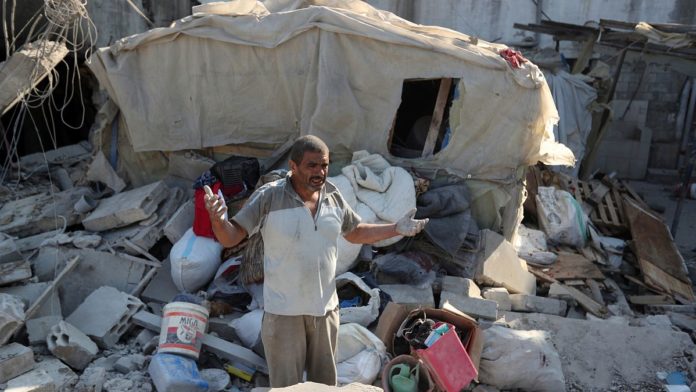Between overcrowding and impossibly high upfront costs, people displaced by an accelerated war are finding it hard to secure temporary homes.
In a home that can barely accommodate one family, Ahmad Mansour shares space with five other families in the Lebanese area of Khaldeh.
Like many who have fled the relentless Israeli bombardment in Lebanon, he has not been spared the greed of landlords, who are exploiting the suffering of people with no choice but to flee the conflict.
This is not the first time the 80-year-old has been displaced, he told Euronews. He left his border town of Aytaroun, which has faced intense Israeli shelling since the onset of the hostilities between Hezbollah and Israel, moving to the town of Kharayeb.
“My family and I spent 14 hours on the road until we reached Beirut,” he said. “We saw death with our own eyes, and we had to stay with our relatives to take shelter from the Israeli bombardment, even though five other families had taken refuge there.”
As an elderly man in need of special care, Mansour had hoped to avoid ending up in a crowded home overfilled with displaced people. However, every property owner he contacted demanded exorbitant rents and imposed harsh conditions, in some cases requiring him to pay several months’ rent or even cover a full year in advance.
The sort of exploitation Mansour faces has been visited upon many families.
Thanks to intensified Israeli attacks on southern and eastern Lebanese villages, recent days have seen a surge in displacement: according to Lebanon’s emergency response coordinator, Environment Minister Nasser Yassin, the number of people driven to leave has surpassed 150,000.
This situation also applies to residents of southern Beirut’s suburbs, some of whom simply cannot afford to leave without becoming homeless.
Maha Farhat, 30, told Euronews that she and her family attempted to leave their home, which was located next to the targeted building in the Israeli assassination of Hezbollah leader Fouad Shukr, but they could not afford alternative housing because of “insane” rental prices.
“The income I get from my job barely helps us buy food and drink, so we were forced to stay in the southern suburbs despite the great danger to our lives,” she said.
The family have been forced to stay with their relatives in the town of Bchamoun, where 15 people are now living in a house that consists of only four rooms.
Caught in between
The head of the Lebanese Association of Real Estate Agents, Walid Moussa, told Euronews that while exploiting people fleeing conflict for personal financial gain may seem beyond the pale, Lebanese law allows property owners to set the prices they consider suitable.
According to Moussa, the resulting exploitation is playing out in multiple ways. Some owners are simply refusing to rent out their homes due to their concerns that new tenants will not be able to make rent if the war drags on. Some also fear that those fleeing their homes and looking to rent might be Israeli military targets.
Other scenarios include demands for advance payments or exorbitantly high monthly rental prices, which Moussa describes as “illogical exploitation”. He believes there should be a law for exceptional situations like wars to prevent landlords from rent-gouging.
The increase in housing prices also applies to other essentials that have seen rising demand due to the influx of displaced people, such as bedding and cushions, as traders have exploited Lebanon’s horrible circumstances to inflate prices.
All these reasons have led the displaced to seek refuge in overcrowded shelters instead of renting homes, Yassin says, with the number of displaced people in shelters reaching about 53,000.
However, there are multiple humanitarian initiatives underway. Schools, universities, churches and mosques have opened their doors to displaced people, showcasing national and humanitarian solidarity that transcends sectarian and political divisions.
Many Lebanese people have rushed to collect donations and distribute them to various shelters, including baby milk, diapers, medicines, food, clothing, hygiene supplies and women’s sanitary products.
Meanwhile, the war continues. Since Monday, when Israel announced the start of an operation it called “Swords of the North” in Lebanon, intense airstrikes have resulted in the deaths of more than 600 people and injured more than 1,600 others — including women, children, and paramedics.


